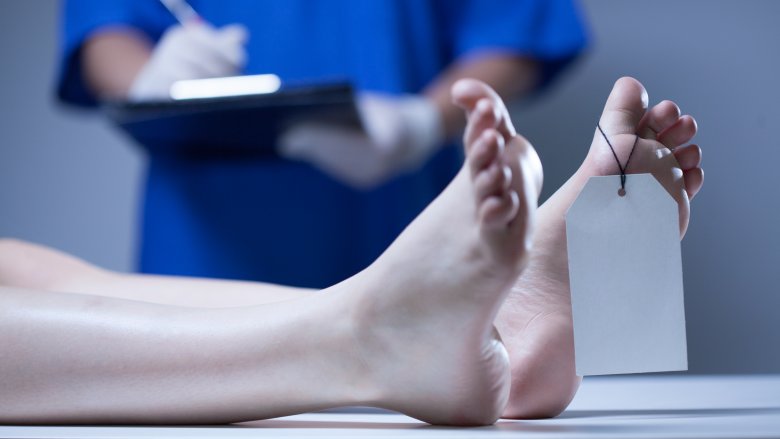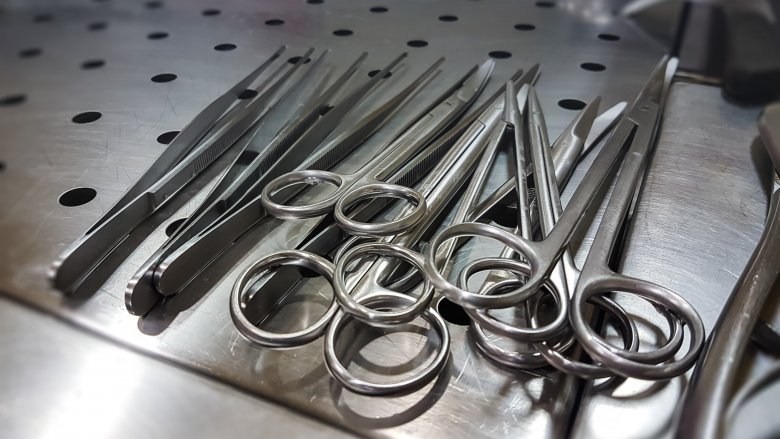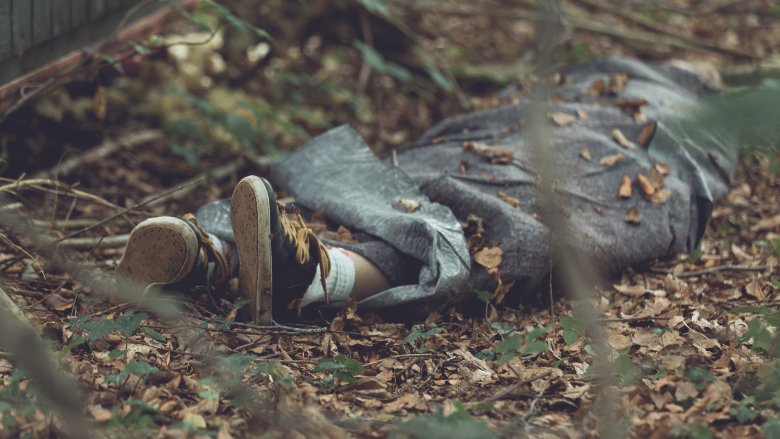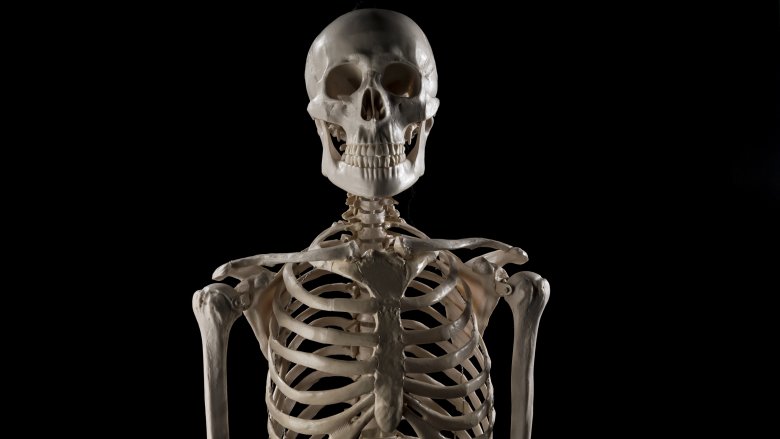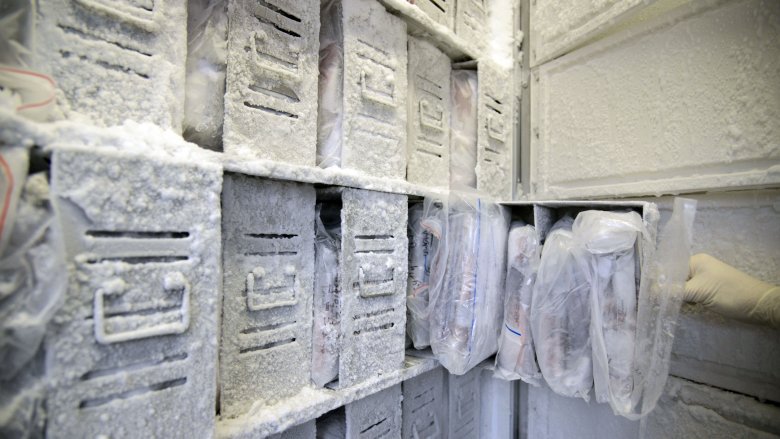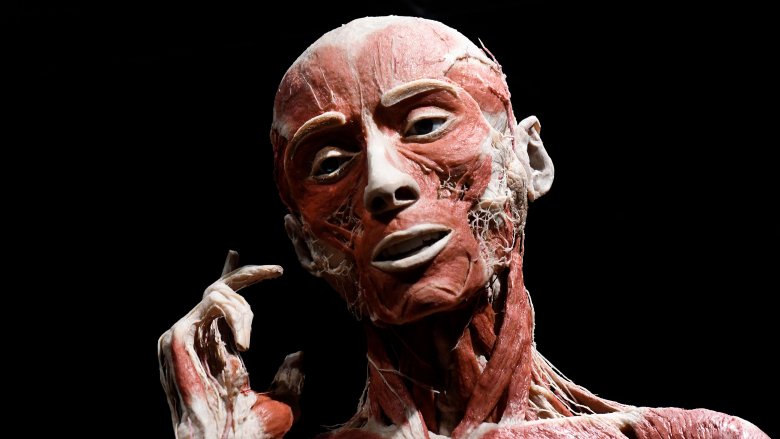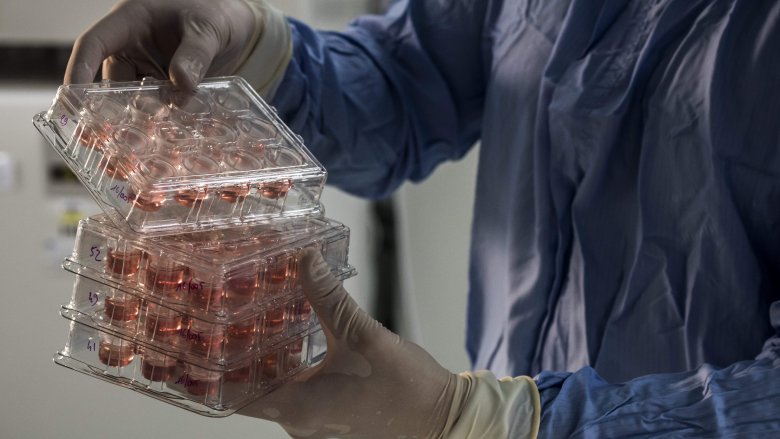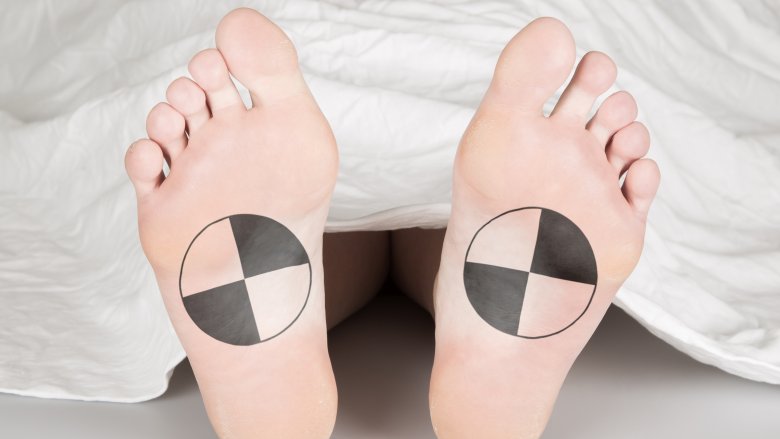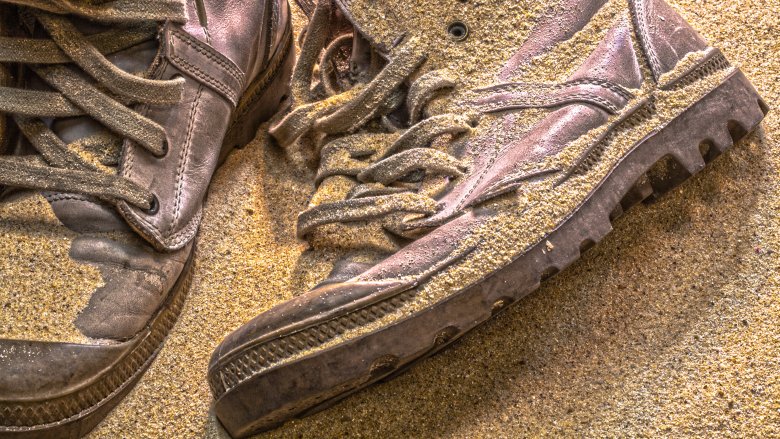When You Donate Your Body To Science, This Happens
So you want to donate your body to science. Or, more accurately, science wants you to donate your body to science. Because let's face it, when you really stop to think about it, donating your body to science might not sound like an awesome idea. What if you end up as the test subject for plastic butt implants, or naked on a table somewhere with a bunch of first-year med students cutting you up into little pieces? Yes, there's not much glamour to being a cadaver, and someone's probably going to have to talk you into it. That will be a lot easier to do if you're at least informed about what might happen to said body when science accepts your generous donation.
The good news is that you do have some pre-humous control over what will actually become of you after you've died, though you do have to be cautious if you'd really like to not end up becoming a crash-test dummy or having your feet blown off during military testing. There are actually a lot of different uses for human cadavers, and it's going to help if you know what they are so you can at least say, "Hey, here's my dead body but just do me a favor and don't blow it up or run over it with a Ford F-350, please."
Temporary, long-term, or forever and ever?
Most people have loved ones who give a crap about what happens to your remains after you've shuffled off. Which means they may experience varying degrees of horror knowing the ultimate fate of their loved one's body, how long it remains out there in the hands of "science," and whether or not they'll ever be able to give it a proper burial.
According to Vice, you get to decide all that stuff in advance, which will hopefully make it easier for your family to stomach. In the U.K., for example, you have a couple different options. You can give "indefinite consent," which means whoever gets your body can keep it for as long as they need it. You can also permit short-term use of a few months, after which your body goes back to your family. Some contracts let the school or facility keep some body parts indefinitely, which is cool as long as you don't spend too much time wondering which body parts.
The consent you give is probably going to depend as much on what your family wants as what you want. For some people, a body is just an empty shell — for others, it's still connected to the person who once owned it and saying "goodbye" would be difficult or even impossible without it. So it's probably smart to discuss your decision with your family, just so they're not blindsided when the inevitable finally happens.
Even in death you can't avoid the paperwork
In life, you're constantly being evaluated. At school, you're tested on aptitude. As an adult, you're considered for job applications, you're rejected by potential mates, and you're rigorously screened for credit applications and promotions. So if there's anything awesome about death (and there isn't, but let's just say there is) it's the fact that you don't have to impress anyone to get there. Death is non-discriminatory. Unless you're donating your body to science.
Yep, scientists don't accept just any any old (or young) corpse. Medical Daily says most people don't qualify to become a medical science cadaver — up to 70 percent of those who apply to BioGift Anatomical, for example, get rejected before they've even died.
To earn the privilege of being posthumously cut up into little pieces, you must first answer an extensive list of questions about your health and social life. Most whole-body donation centers will exclude people who have communicable diseases like HIV and hepatitis, but you may also get the postmortem boot if you're overweight. And just because you get into the program while you're still living doesn't mean they'll take you after you die — sometimes your manner of death excludes you. If you had to be autopsied, for example, you're no good to medical students. And if you had traumatic injuries because of a particularly violent car accident, you'd probably be excluded, too. Talk about kicking a dead guy when he's already down.
A bunch of strangers will know you as no one ever has
Some who donate their bodies to science might not think too much about what specifically could happen to their remains. It's enough to just check a couple of boxes on your organ donor card and leave the rest to the scientists.
If you choose "research and education," there's a pretty good chance you'll end up on a cold, metal table in a classroom, attended by first-year medical students in various emotional states ranging from delighted to serious to about-to-vomit. According to National Geographic, "disassembling" a corpse is something every medical student can expect to do early in the educational process. And with roughly 20,000 new doctors graduating med school every single year, demand for willing dead people is especially high.
It's still hard to think about, since your body currently belongs to you and the idea of it naked, vulnerable, and being cut into bits by a bunch of awkward students is sort of horrifying. So it may comfort you to know that most schools teach respect along with anatomy. At Stanford, for example, students are asked to participate in a moment of silence to honor the lives of the people on the examining tables. And most are grateful for the learning opportunity — it's one of the first steps on the long road to becoming a physician, and helping those students get there is a pretty noble way to give your death some meaning.
Au naturel
Suppose you've always been sort of claustrophobic. The idea of a coffin gives you anxiety, and you don't like fire very much, either. Or maybe you think nature intended for corpses to decompose out in the open air.
Your family will probably get in trouble for abandoning your corpse in a national park, but that's not the only way you can fulfill your fantasy of rotting away in a pile of leaves while buzzards peck out your eyeballs. A "body farm" will grant your wish of au naturel decomposition, as long as you let them study your rotting corpse over a period of weeks in the name of science. According to Wired, The University of Tennessee's Body Farm, a 2.5-acre "outdoor laboratory," is a temporary resting place for around 150 corpses, some fresh, some skeletal, some horrifically in between. Some bodies are in water, some are in the sun, some are stuffed in the trunks of old cars.
What's the point of all this, besides helping the Body Farm earn the title of creepiest place in the universe? Forensic scientists can use the information to build decomposition timelines for bodies that have been left in different conditions. That information can point to a time of death and help solve murders. So your choice to decompose au naturel is not just a zen, one-with-the-Earth decision, it's also a way for you to fight crime after death. How cool is that?
Become a super scary skeleton
Every med school has at least a couple genuine human skeletons on display. Have you ever wondered where those skeletons came from, and how they ended up mounted on a stand in the corner of the room?
Some people donate their bodies to science specifically for the purpose of becoming skeletons, which is actually pretty cool when you think about it. It's a kind of immortality — you'll remain standing for decades after your death, and maybe even longer than that. During that time, you get to gaze creepily at first-year med students. Hopefully, you'll occasionally scare the bejeebers out of someone who stayed late in the lab one night. As far as donating your body to science is concerned, this one falls just below "saving lives" as the thing most worth doing after death.
Some groups take bodies specifically for the purpose of making them into skeletons. The Maxwell Museum of Anthropology is one such place. Some facilities will take just about anyone, while others are looking for bones that have a more scientific value — the skeletons of cancer patients, for example, can provide valuable insight into bone metastasis, and skeletons with osteoporosis can help scientists discover potential treatments.
Other places — like the Body Farm in Tennessee — will clean up your bones after you're done decomposing, and then catalog and tag them. And here's the weird part: After you've become a skeleton, your family gets to visit you and see how nicely you clean up.
Travel the world posthumously
Let's say you've always wanted to see the world, but you just never had the money or the time. If you donate your body to science via a "body broker," you might get to travel the world posthumously. (Note: Don't do this if you're a foodie — not being able to taste all those exotic foods would probably kill you.)
Body brokers are kind of like junk yard operators. They pick up dead cars/bodies, disassemble them, and then sell off the parts. Unlike whole-body donation centers, a body broker often sells internationally. There's actually a huge market for dead Americans, and there's a pretty simple reason why: because cadavers are in short supply in nations where customs and traditions dictate what can be done with a dead body. Some cultures insist on treating their members with reverence, but cutting up dead Americans is totally cool.
According to Reuters, different institutions are interested in different body parts, which makes selling them piecemeal more practical. If that sounds a little unsettling, just wait for the rest of the story — families don't always understand that their loved ones might be dismembered and sent overseas, and not every body broker is on the up and up, either. In early 2018, a body broker named Arthur Rathburn was convicted for selling body parts infected with HIV and hepatitis, and keeping them in "grisly, unsanitary conditions." So if you do decide that body brokering is for you, at least try to be selective.
Get flayed and stuffed with plastic
If you'd rather travel the world more or less intact, you could consider donating your body to a "human body" exhibit. According to NPR, corpses in these fascinating but morbid exhibits are "plastinated," which basically just means that fluids are replaced with liquid plastic, a process that maintains the body's natural appearance.
Plastination was made famous by Gunther von Hagens's "Body Worlds," which displays plastinated bodies in various states of looking like they've been flayed alive. Not everyone thinks displaying plastinated human bodies is a great idea. A lot of critics say it's disrespectful to the dead, but people on the donor list for plastination seem to think of it as a kind of immortality — sort of like being the skeleton in the biology classroom only you get to stare at people with your actual, plastinated eyes instead of the gaping sockets of your empty skull.
If you love this idea, you can register to be a donor through the Institute for Plastination, but that's not a guarantee you'll get to be a part of the show. The institute has more than 13,000 registered donors waiting to be immortalized in plastic, and very few openings in their traveling exhibit. Instead, it promises you'll be used for "medical training of doctors" and, vaguely, for "the general medical education of the public." So you might not be a plastinated star or anything, but you'll still get to do some good. Creepy, creepy good.
Save a life, or make someone's lips bigger
Tissue donation is closely related to organ donation, but the difference is tissue can be harvested up to 24 hours after death, while most organs need to be harvested right away because they will rapidly begin to deteriorate when starved of oxygen.
Tissue donation can potentially save lives, just like organ donation can, but tissue donation is also big business, which means someone else is going to be profiting off your death. If that sounds kind of unsavory, it's because it's totally unsavory.
According to NPR, the tissue industry as a whole is worth about $1 billion annually, and one human body is worth about $80,000 in tissues. That's right, if you could get an advance on what your body is worth after death, you could buy a 2018 Alfa Romeo Stelvio Quadrifoglio. In cash. So your generous donation of your mortal remains might feel altruistic, but that doesn't mean someone isn't profiting from your death. Worse, there's no guarantee your tissues are going to save someone's child or father — they're just as likely to be used to give someone extra-luscious lips or fully functioning man-bits. If you don't want parts of your body to end up in someone else's junk, you might want to choose your tissue harvesting company carefully — nonprofits are more likely to treat your body with respect rather than as a cadaver-sized gold mine.
Die again, in a car crash
Most people don't realize that donating your body to science doesn't always mean for medical research. Other industries depend on cadavers, too — the auto industry, for example. But wait, what about those ads from the '80s featuring sentient crash-test dummies, aren't those the guys that take all the knocks in safety testing? Mostly. But a crash-test dummy can't tell you everything that might happen to a human body in an accident. For that you need an actual human body.
According to Wired, automakers don't procure cadavers to use in their own tests, mostly because that would be really bad press for them. (It's hard for the average person to stomach the idea of their departed loved one strapped into the driver's seat of a vehicle and then propelled at 60 mph into a brick wall.) So manufacturers distance themselves from the whole dead body thing by asking universities to do cadaver testing on their behalf, and then they sit around and wring their hands hoping no one will leak a video of a real human getting mushed in their cars.
It is important research and as a human crash-test dummy you do save lives — maybe not in the same way as an organ donor or if you end up in some guy's junk, but helping automakers build safer cars can indirectly save a lot of people. It's not very glamorous, but glamour hasn't been a common thread in this list anyway so don't get picky now.
Get exploded
If becoming a crash-test dummy seems too gross and violent, you might want to go out of your way to make sure your corpse doesn't end up in the hands of the military. Why, oh why does the military need corpses? Because they need to know if their new boot design will stop soldiers from losing feet if they step on a landmine, and the best way to do that is to make a cadaver step on a landmine.
This isn't usually a scenario that will please your family (depending on your family). And the military knows that, which is probably why some corpses pass through a sort of gray market before arriving at their final destination.
According to the Markkula Center for Applied Ethics, that's how some bodies got from the Tulane School of Medicine to the military, which paid roughly $30,000 per body. And Tulane wasn't even aware this was happening — it transferred bodies "it couldn't use" to a body broker, assuming incorrectly that the bodies would go from there to medical schools.
That's not to say the military doesn't obtain most of its corpses legitimately, or that you shouldn't register to be exploded in a land mine simulation if you want to commit yourself to potentially saving soldiers in the line of duty. It's still a noble cause if you can get past the whole exploding thing.
Receive an all expenses paid, slightly lame funeral
It's pretty hard to think of your fleshly husk as anything less than you, even when you're no longer in it. And though altruism does tend to be the top motivator behind whole-body donation, there are some other factors at play, too.
First, funerals are expensive. A "traditional funeral" with a burial and a headstone costs between $7,000 and $10,000. Cremation is cheaper, but it will still run you at least $1,500 — that's a lot of money for some people. Given those hard realities, it's unsurprising that some people just don't claim their loved ones' bodies.
Whole-body donation is one possible solution to the problem — according to Vice, some institutions will cremate donor bodies after they've been released and provide a short funeral service complete with a chaplain at no cost to the family. There won't be any big screen TV with images of the departed on loop or stories from grieving loved ones, but the good news is if you've always dreamed of being a fly on the wall at your own funeral, you could probably attend one of these generic donor services before you die and know pretty much exactly what's going to happen at yours. But if you think the greater gift is saving your family the expense of all those flowers and a shiny wooden coffin, that's a pretty good reason to donate your body to science.
